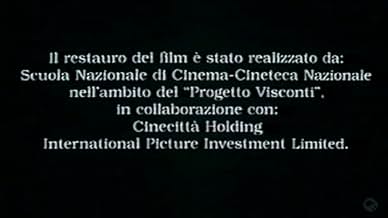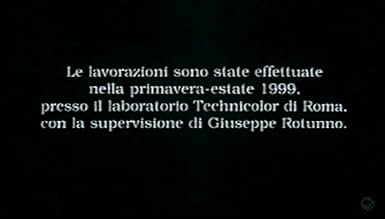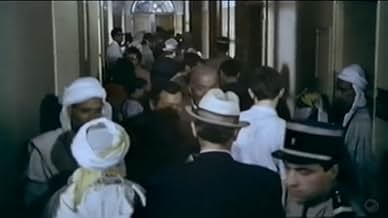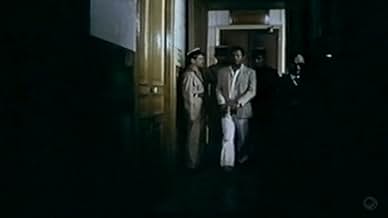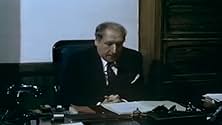NOTE IMDb
7,1/10
3,4 k
MA NOTE
Le drame intérieur d'un homme pur sa refusant à régler ses actes sur des apparences extérieures fausses.Le drame intérieur d'un homme pur sa refusant à régler ses actes sur des apparences extérieures fausses.Le drame intérieur d'un homme pur sa refusant à régler ses actes sur des apparences extérieures fausses.
- Réalisation
- Scénario
- Casting principal
- Récompenses
- 4 nominations au total
Jean-Pierre Zola
- Employer
- (as Jean Pierre Zola)
Avis à la une
Inspired by Albert Camus' seminal work of 1942, one is hardly likely to see a more faithful or indeed reverential adaptation than this.
It is easy to get bogged down in discussions as to whether or not Camus' piece is Existentionalist. He himself denied this and it is probably safer to say that if anything, it represents the philosophy of the Absurd.
The novel is written as a first person narrative by the 'Stranger' of the title although I have always felt the alternative title of 'The Outsider' to be far more appropriate. Arthur Meursault by name, he is the sheikh of apathy and his total indifference is evident in both his manner and such utterings as "It doesn't really matter" or "It makes no difference one way or the other." He cannot bring himself to show any grief at his mother's funeral and reacts impassively to his adoring girlfriend's suggestion of marriage. He is even unable to give a reason for his apparently motiveless shooting of an Arab other than "I think it was the sun." He simply does not behave as society dictates he ought and for his inability to play the game he pays the ultimate penalty.........
I cannot agree with the view that Marcello Mastroianni is miscast in the role. He had previously worked with Visconti in the cruelly underrated 'Le Notte Bianchi' of 1957 and during the intervening years he had become the finished article and excelled for Fellini, Antonioni, Bolognini, Germi and de Sica. Very few actors convey blankness or lassitude quite as well as he which makes his final rant against the religious platitudes of the prison chaplain so dramatically effective. By all accounts he lobbied for the role and turns in a splendid performance.
Visconti is the most 'operatic' of directors which is why he seems an odd choice for this austere, almost Bresson-esque material. He has of course the services of a fine cast, notably a touching Anna Karina as Meursault's lover, Georges Geret as a pimp, Bernard Blier as Meursault's feeble defence lawyer, Georges Wilson as an evangelical examining magistrate and Bruno Cremer as the prison chaplain.
The sun-baked imagery and oppressive heat are wonderfully captured by Visconti's chosen cinematographer Giuseppe Rotunno whilst Piero Piccioni, much favoured by Bolognini, contributes one of his most offbeat scores.
This is not really to do with plot but is all about 'mood'. Both novel and film are pervaded by a sense of 'Ennui', that evocative word that covers so many negative emotions.
The ultimate challenge is to make a film about boredom without its being boring. Has Visconti succeeded? On balance, with minor reservations, I think he has.
It is easy to get bogged down in discussions as to whether or not Camus' piece is Existentionalist. He himself denied this and it is probably safer to say that if anything, it represents the philosophy of the Absurd.
The novel is written as a first person narrative by the 'Stranger' of the title although I have always felt the alternative title of 'The Outsider' to be far more appropriate. Arthur Meursault by name, he is the sheikh of apathy and his total indifference is evident in both his manner and such utterings as "It doesn't really matter" or "It makes no difference one way or the other." He cannot bring himself to show any grief at his mother's funeral and reacts impassively to his adoring girlfriend's suggestion of marriage. He is even unable to give a reason for his apparently motiveless shooting of an Arab other than "I think it was the sun." He simply does not behave as society dictates he ought and for his inability to play the game he pays the ultimate penalty.........
I cannot agree with the view that Marcello Mastroianni is miscast in the role. He had previously worked with Visconti in the cruelly underrated 'Le Notte Bianchi' of 1957 and during the intervening years he had become the finished article and excelled for Fellini, Antonioni, Bolognini, Germi and de Sica. Very few actors convey blankness or lassitude quite as well as he which makes his final rant against the religious platitudes of the prison chaplain so dramatically effective. By all accounts he lobbied for the role and turns in a splendid performance.
Visconti is the most 'operatic' of directors which is why he seems an odd choice for this austere, almost Bresson-esque material. He has of course the services of a fine cast, notably a touching Anna Karina as Meursault's lover, Georges Geret as a pimp, Bernard Blier as Meursault's feeble defence lawyer, Georges Wilson as an evangelical examining magistrate and Bruno Cremer as the prison chaplain.
The sun-baked imagery and oppressive heat are wonderfully captured by Visconti's chosen cinematographer Giuseppe Rotunno whilst Piero Piccioni, much favoured by Bolognini, contributes one of his most offbeat scores.
This is not really to do with plot but is all about 'mood'. Both novel and film are pervaded by a sense of 'Ennui', that evocative word that covers so many negative emotions.
The ultimate challenge is to make a film about boredom without its being boring. Has Visconti succeeded? On balance, with minor reservations, I think he has.
Luchino Visconti's sublime adaptation of Camus' "unfilmable" existentialist classic is all but forgotten. It's one of Visconti's best films, a searing, intelligent film. Marcello Mastroianni reportedly stepped into the role of Meurseult, which Visconti had earmarked for his protégé Alain Delon, who would have been too pretty to play the character. Mastroianni gives a masterful performance. As his mistress Maria Cardona, Anna Karina is stunning. She is especially moving in the courtroom scene. Giuseppe Rotunno's cinematography is peerless. Pauline Kael voted this as one of the top three films of 1967, after "Bonnie and Clyde" and "Chimes at Midnight". I hear that the reason why the movie isn't available on DVD or video is because of the rights. Hope this is rectified soon.
Very truthful to the novel of Albert Camus, capturing the book's atheistic and existential mood. All the actors (specially Mastroianni) are very close to what the novel suggests. Yet the film is not a major work of Visconti--it merely adapts an important literary work. One of the best visual sequences in the film is of Mr Mersault sitting on a chair viewing his mother's closed coffin at a distance with another lady sitting closer to the coffin with her nose covered. Throughout the film Visconti underscores the heat and the oppressive humid weather that led to the death of the Arab. A second important sequence involves a kind act of an Arab prisoner who offers Mersault a makeshift pillow and a cigarette in a crowded prison cell. The "bad" Arab can be a "good' one!
The book is better than the film despite all the efforts of Visconti and his talented team, which included three other co-scriptwriters.
The book is better than the film despite all the efforts of Visconti and his talented team, which included three other co-scriptwriters.
A naked room, a dead old woman lies on a wooden coffin, across the coffin we see her son. His head down, his face slightly contorted. We move in to notice with a chill that he's just trying to get some dirt from under his fingernails. Mersault. Visconti's Mersault inspired by Camus's Mersault. The film was attacked in its day and the Albert Camus's purists shouted blue murder or worse, they didn't say a word. Visconti knew what he was doing. He chose Marcelo Mastroianni to play Mersault. By that choice alone he was departing from Camus's intentions and yet, if you read the book today and see the film today, Mastroianni is Camus's Mersault. It is the driest of all Visconti films. His toughest. Mastroianni gives a performance that defies description. If you've seen more than once,"XXX" by choice, I don't promise you that you'll surrender, automatically, to the power of this film, but I can assure you that both films belong to the same Universe, yours, ours. Give it a try. Then, you tell me.
Reviewing isn't really my thing. However, it seems that some information about this film, information that was only fully told when the film was restored in 2001, isn't easily accessible in English. So, here's the rundown:
1- during the long gestation of the project (from 1962), Visconti was often tempted to underscore the political side of the novel; this was shot down by the Camus family.
2- the first choice to play Meursalt was Alain Delon, but negotiations fell apart. In came Mastroianni, who offered to make the movie for half his usual pay. There was no way producer De Laurentiis would say no.
3- Visconti had envisioned a flashback structure to the film, with different viewpoints. The Camus widow imposed a writer of her choice (Roblès) to ensure literal faithfulness to the novel.
4- at this point Visconti tried to walk out, but he was bound to make this film by contract, and had to despite losing all enthusiasm. He was to remember it as his worst film.
Now for the vote. It is professionally done, and while Marcello gives a completely different take on Meursalt from the book - close your eyes and imagine young Delon instead - he gives it his best. A sufficient effort, if one does not think of what it could have been.
1- during the long gestation of the project (from 1962), Visconti was often tempted to underscore the political side of the novel; this was shot down by the Camus family.
2- the first choice to play Meursalt was Alain Delon, but negotiations fell apart. In came Mastroianni, who offered to make the movie for half his usual pay. There was no way producer De Laurentiis would say no.
3- Visconti had envisioned a flashback structure to the film, with different viewpoints. The Camus widow imposed a writer of her choice (Roblès) to ensure literal faithfulness to the novel.
4- at this point Visconti tried to walk out, but he was bound to make this film by contract, and had to despite losing all enthusiasm. He was to remember it as his worst film.
Now for the vote. It is professionally done, and while Marcello gives a completely different take on Meursalt from the book - close your eyes and imagine young Delon instead - he gives it his best. A sufficient effort, if one does not think of what it could have been.
Le saviez-vous
- AnecdotesTwenty years before Visconti's adaptation, while Camus was still alive, the novelist had been approached with the idea of making The Stranger as a film by director Jean Renoir.
- Crédits fousThe restoration of the film was carried out by: the National Film School - National Film Library, as part of the 'Visconti Project' in collaboration with Cinecitta Holding International Picture Investment Limited. The work was carried out in the spring & summer 1999, at the Technicolor Laboratory in Rome, under the supervision of Giuseppe Rotunno.
- ConnexionsReferenced in Costumes from the Films of Visconti (1978)
Meilleurs choix
Connectez-vous pour évaluer et suivre la liste de favoris afin de recevoir des recommandations personnalisées
- How long is The Stranger?Alimenté par Alexa
Détails
- Date de sortie
- Pays d’origine
- Langues
- Aussi connu sous le nom de
- The Stranger
- Lieux de tournage
- Sociétés de production
- Voir plus de crédits d'entreprise sur IMDbPro
Contribuer à cette page
Suggérer une modification ou ajouter du contenu manquant

Lacune principale
By what name was L'étranger (1967) officially released in Canada in English?
Répondre
